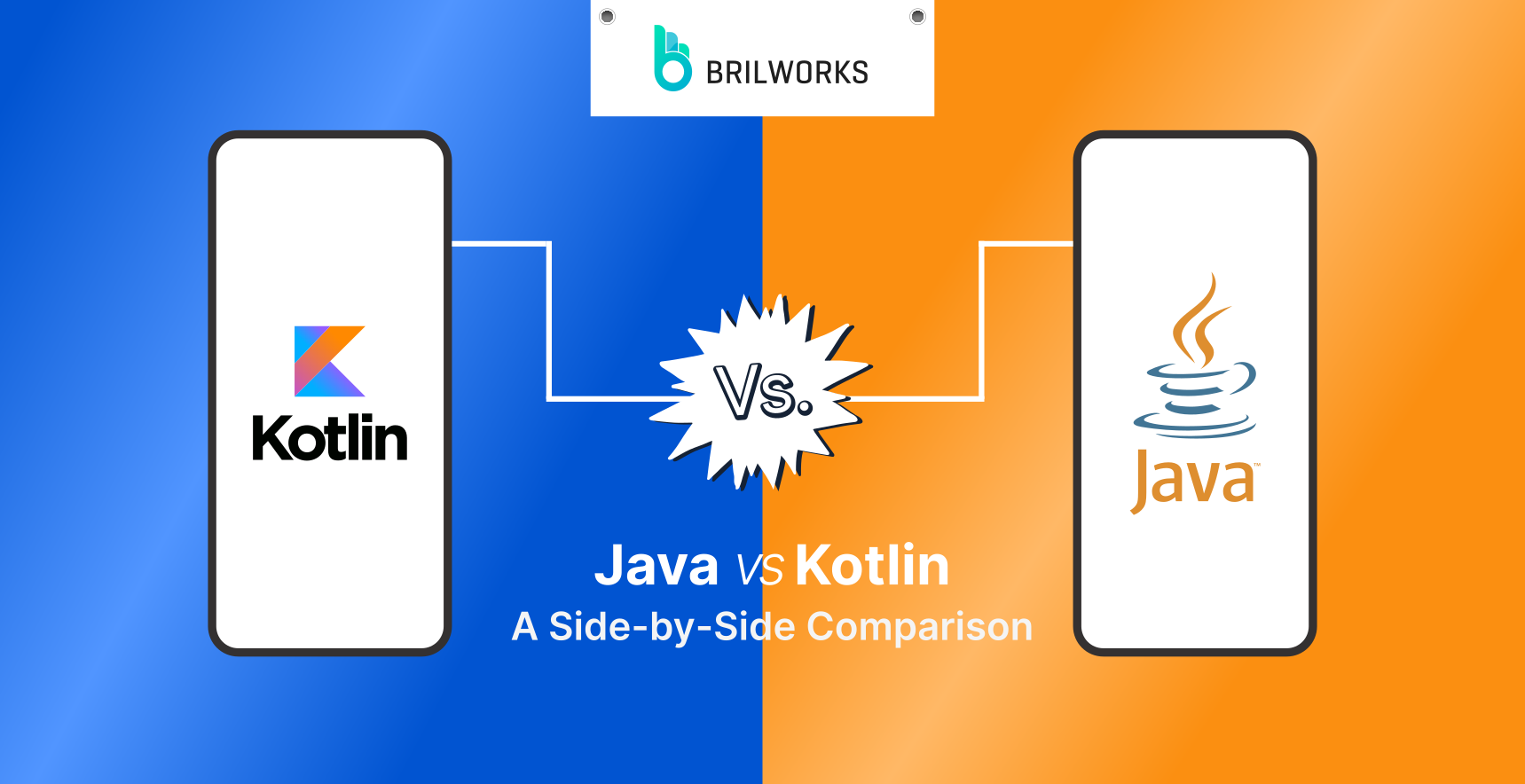COOPERATION MODEL
ARTIFICIAL INTELLIGENCE
PRODUCT ENGINEERING
DevOps & Cloud
LOW-CODE/NO-CODE DEVELOPMENT
INDUSTRY
FRONTEND DEVELOPMENT
CLOUD DEVELOPMENT
MOBILE APP DEVELOPMENT
LOW CODE/ NO CODE DEVELOPMENT
EMERGING TECHNOLOGIES








Java is an incredibly popular and versatile programming language that is used in web, mobile, and desktop application development. On the other hand, Kotlin is a newer, more advanced version of Java, and it has a bunch of modern features that Java doesn’t have. However, if you are used to Java, there are several things you can miss in Kotlin.
In this article, we will compare the syntax, features, performance, and cost associated with developing programs in both languages so you can understand which language is suitable for your project.
Java is a versatile, mature, platform-independent, general-purpose programming language that has maintained its prominence for more than two decades. Kotlin is a newer programming language inspired by Java, with a handful of modern features that help developers write programs in a more concise way.
Both languages are used in the development of a variety of applications. However, there are some scenarios where you may prefer one over the other, which we will discuss in a later part of this article. For example, Kotlin has an upper in Android application development while Java is still dominating the server-side, web, and desktop applications.
In fact, Kotlin was developed to address some of the limitations in Java, which has contributed to its growing popularity. Since it is fully interoperable with Java (you can use existing Java libraries, APIs, frameworks, and code and even mix both in one project), it also adds to the functionalities of Java.
Considering these factors, the debate among developers has consistently revolved around Java vs Kotlin. While no programming language can definitively claim superiority, a particular language may prove more suitable once your specific requirements become clear.
Let's explore some key factors that deserve your attention to help you make an informed decision.
Kotlin is like a concise poem, while Java is like a verbose essay.
Kotlin is designed to support both object-oriented and functional programming paradigms, which allows developers to write code that is both expressive and concise. Additionally, Kotlin offers a more concise syntax.
Here is a simple program to calculate the sum in Java and Kotlin that compares the conciseness of the two languages:
In Java
In Kotlin
Both programs perform identical tasks, but it's the Kotlin program that glides gracefully with a touch of readability. For example, in Kotlin's for loop, it doesn't just use the mundane "for" keyword and the mundane "i < 10" condition – it has "until" keyword, making the program more human readable.
In addition to this, there is a wealth of improvement Kotlin has to offer for Java developers, including a few of them, such as you don’t need to explicitly specify the data type, Kotlin’s function declaration is shorter, etc.
On the other hand, Java requires variables and expressions to be declared explicitly. Therefore, Java has a relatively verbose syntax, with many keywords and punctuation marks.
Kotlin is also a statically typed language, but it has a more concise syntax than Java. Kotlin uses type inference to automatically determine the types of variables and expressions, which can make code more readable and maintainable.
In terms of writing programs, Kotlin has the upper hand, and you can express the same functionality with less code in a concise way.
More specifically, Kotlin is a newer language with modern features compared to its counterpart, Java. They share many common features, but there are also several distinct features that developers often evaluate from their perspective.
Features such as Explicit nullability and Extension functions help developers write more reliable and maintainable codebases in Kotlin. On the other hand, Kotlin does not have the ternary operator, static members, checked exceptions, and protected features.
Let’s examine in detail the features comparison in Java and Kotlin.
NullPointerException. They are a significant problem in Java projects.They both have similar performance, as they are compiled to bytecode and run on the JVM. Kotlin may have a slight advantage over Java in certain cases. However, Java code is typically compiled faster than Kotlin, especially when using reflection.
On the other hand, Kotlin may outperform Java for small and simple programs, as some benchmarks have shown that Kotlin has better performance than Java in these cases. Additionally, Kotlin's unique features, such as null safety and immutable data structures, can also contribute to the performance of Kotlin programs.
NullPointerException can reduce the number of runtime exceptions, resulting in improved performance of the application.
In summary, choose Java if you need to develop large and complex applications, as it is a mature language with robust resources. Kotlin is a newer language, but it is taking over Java for small application development due to its concise syntax and modern features.
Java
Java has been around for a long time and has a massive community. This translates into a wealth of resources, libraries, frameworks, and essential tools for developers. You can find solutions to almost any issues that you may encounter.
Additionally, Java has a great ecosystem of tools and IDEs, like Eclipse and IntelliJ IDEA, backed by a robust community of contributors.
Kotlin
Kotlin is relatively new, but its community is growing rapidly. You will also find many libraries and several frameworks available for Kotlin development, and support is available from Google and other companies. Kotlin's official website, along with online communities like Stack Overflow and GitHub, provides ample resources for learning and troubleshooting.
While Kotlin is designed to be fully interoperable with Java, it doesn’t have the same level of compatibility with legacy Java code. There may still be some cases when you encounter challenges when interacting with older Java codebases.
Furthermore, Java can leverage native code libraries to access hardware and other resources that are not directly supported by the JVM. Kotlin cannot use native code directly; however, you can use third-party libraries that provide bindings to native code libraries.
Kotlin has support for functional programming: it has it from the ground up. Java, on the other hand, added support for functional programming later in Java 8. The support for functional programming gives Kotlin developers a number of advantages.
Kotlin's functional programming features make it possible to write code that is more concise and expressive.
For example, the following Kotlin code uses a lambda expression to sort a list of strings:
Kotlin
This code is much more concise and expressive than the equivalent Java code:
Java
Kotlin's functional programming features make code more maintainable because they make it easier to reason about code and to identify potential problems.
For example, the use of lambda expressions makes it clear which function is being applied to which arguments.
Kotlin's functional programming features make code more expressive because they allow developers to write code that more closely matches their mental model of the problem they are trying to solve.
For example, the use of higher-order functions can make it easier to write code that is reusable and composable.
Overall, Kotlin's superpower for functional programming gives developers a number of advantages in terms of conciseness, maintainability, and expressiveness.
Java and Kotlin are both excellent programming languages. Java has a longer history and a larger community, while Kotlin is a newer language with a more modern syntax and features.
The best language for you will depend on your specific needs and preferences. If you are looking for a language with a large community and a wide range of features, then Java is a good choice. If you are looking for a language with modern syntax and features, then Kotlin is a good choice.
If you are new to programming, we recommend starting with Java. Java is a good language for learning the basics of programming, and it has a large and active community of developers.
If you are already a Java developer and you are looking for a more modern language with a concise syntax, then we recommend Kotlin. Kotlin is a good choice for Android development, and it is also becoming increasingly popular for other types of development.
Get In Touch
Contact us for your software development requirements
Get In Touch
Contact us for your software development requirements